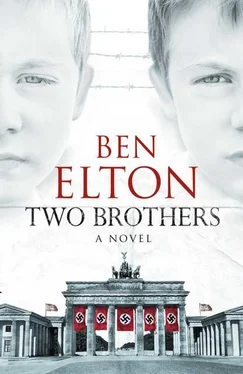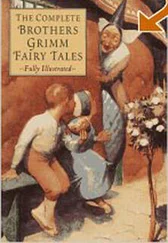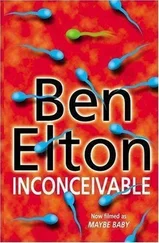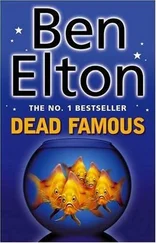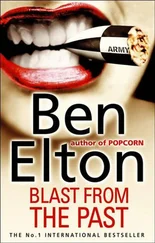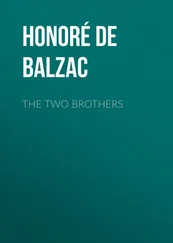Frieda struggled to remain calm and matter-of-fact as she cleared away the supper things.
‘Don’t forget your homework,’ she told the boys, ‘and scrape your football boots into one of the window boxes.’
Wolfgang just sat at the window and looked at the sky, cursing quietly under his breath. Slowly picking out the recent American hit Happy Days Are Here Again on his ukulele. Until Frieda told him to stop.
Not because she didn’t appreciate the irony. But because she was scared. Since noon that day when the announcement had been made and that man had appeared, smiling, almost for the first time in his public career, it had been unsafe for Jews to draw attention to themselves. The ukulele was a penetrating instrument. And the walls of the apartment were thin.
The Penny Dropped
London, 1956
STONE WOKE UP from his Wannsee dream.
He had been back on the little beach beside the lake. His brother was there, as he always was. And Dagmar. Just as it had been on that day.
Except in the dream, of course, Dagmar chose him. And it had been him who brushed his lips on her rain-dappled shoulders.
And, unconscious on his pillow, Stone’s sleeping soul had soared.
Now he was awake, experiencing the same deflation that he always suffered when awakening from that beautiful Wannsee dream. And there was something more.
Somehow in his sleep, while he dreamt, his mind had been working. Trying to make sense of what he had been told on the previous day, in the bare room in Kensington. And now, eyes wide open, suddenly completely awake, it was as if a veil of emotion had been lifted and he was able to see things clearly for the first time since he had received his letter from Berlin.
The story he had been given wouldn’t do.
It simply did not add up.
Essentially those men from MI6 had told him two things. The first, that Dagmar was alive. The second, that somehow her ruptured life journey had led her to the Stasi.
Stone now saw that in his eagerness to believe the first, he had accepted the second at face value.
He got out of bed and went to put the kettle on. The lino was cold against his feet. The pre-dawn air was chilly.
He struck a match in the darkened kitchen and the gas ring popped into life, the flickering blue flame casting faint shadows across the room. Stone fumbled for his jacket and found his smokes. He didn’t switch on the light, somehow he felt he could focus better in the dark. He bent forward and lit his cigarette from the gas. No point wasting a second match.
He smoked hungrily. Watching the glowing tip grow bright and then subside as he drew deep and then exhaled. Bright. Then dim. Bright. Then dim. And with each new spark he sensed his thoughts becoming clearer. Almost as if that throbbing red tip was flashing out a warning. A silent alarm.
The whistle on the kettle shrieked.
It was a siren. Like the thousands he had heard before. Police sirens. Air-raid sirens. All meaning one thing. Trouble was coming. Danger was near.
He let the kettle keep boiling. The screaming seemed to focus his thoughts. Its ugly, jarring whine pushing him towards the conclusion he was dreading.
That the men from MI6 were wrong.
That Dagmar was dead, as for so long he had believed her to be.
The precious letter was a forgery. Cobbled together from other, older material, genuine letters, diaries perhaps. Long-buried memories. The Stasi were good at that sort of thing.
He was being lured back to Berlin.
PAULUS AND OTTO were cornered.
They never should have come, of course.
How could they have imagined it would be the same as before? That they could just turn up in their footie kit at the old field, the way they had done for years and years, and play?
Paulus had been worrying about it all week. He’d even pinned a map of the local area to their bedroom wall the better to consider escape routes.
‘If we get chased,’ he said, ‘we don’t want to end up in a blind alley. There’s two near the recreation ground plus a walled building site. We need to know the best way out from every corner of the field and how to make for the U-Bahn station, OK?’
‘If we get chased,’ Otto said grimly, ‘we fight. There’s only four fucking Nazis on the team.’
‘Otts, they’re all Nazis now.’
‘Look, it’s our team. We’ve been OK at school, haven’t we?’
‘So far.’
It was true, they had. There had been a few murmurs and angry mutterings, not least from a couple of the teachers, but so far nothing worse. Maybe things would be all right at soccer too.
Even Frieda and Wolfgang had agreed that they should go. The boys had been on the team since they were eight. Five years playing with the same lads had to mean something.
But now as Paulus and Otto found themselves cornered in the changing shed they knew it didn’t.
Quite without warning their former team-mates had turned into a snarling, vengeful mob and the Stengel boys were in big trouble.
‘ Jude! Jude! ’
The big lad, Emil, began to formalize the chant, ominously beating the wooden walls of the little changing hut with a rounders bat. ‘Jew! Jew!’
The brothers stood side by side. Paulus had hold of a chair and Otto was preparing to use a dustbin lid and a broken corner flag as a sword and shield. The Stengel twins were formidable when they stood side by side and their assailants knew that, which was why for a moment at least they held back.
‘Filthy fucking Jews,’ Emil shouted, breaking the rhythm he had been banging out and taking a step towards the boys. ‘Now you’re going to pay for everything you’ve done to Germany.’
Paulus and Otto looked at the angry faces ranged against them. Emil had of course always hated them, he was the sort of boy who hated everybody, particularly the ones who stood up to him. But many others in the team had been their friends. Only a fortnight before, Otto had been sitting atop their shoulders having scored a direct goal from a corner kick in an important youth league match. But Hitler had been Chancellor for over a week now and the speed with which Paulus and Otto’s world had changed had been breathtaking.
Emil Braas had grabbed his first chance to avenge himself on the Stengel boys. For being better footballers than him.
For being popular and easy-going while he was sullen and had a reputation for spite.
For being attractive to girls while he was laughed at and teased by even quite ugly ones for being dull and lumbering.
This was Emil’s chance, as it was that month for every embittered, failed and inadequate fool in Germany. To be the big man at last.
Otto knew the score. He knew boys like Emil and as far as he was concerned there was only one course of action available to him.
Hit first and hit hardest.
That was his rule.
But Paulus hated that rule. He had a different one. Never confront if you could negotiate. That was the clever way. Yes, hit hard if you had to, but first, try not to hit at all.
Otto had already raised his weapon hand, the muscles on his bare arms and chest taut and prone. He was not quite yet even thirteen but already he had the physical definition of an athletic young man, of a fighter.
Paulus was in good shape too, Wolfgang had made sure of that. But he did not raise his weapon. Instead he laughed.
As a tactic, it had the benefit of surprise, if nothing else.
The crowd of adversaries looked taken aback, but they didn’t lower their fists.
‘What are you laughing at, Jew boy?’ Emil sneered.
‘Well, your face for one,’ Paulus replied, ‘but I ain’t talking to you.’
Читать дальше
